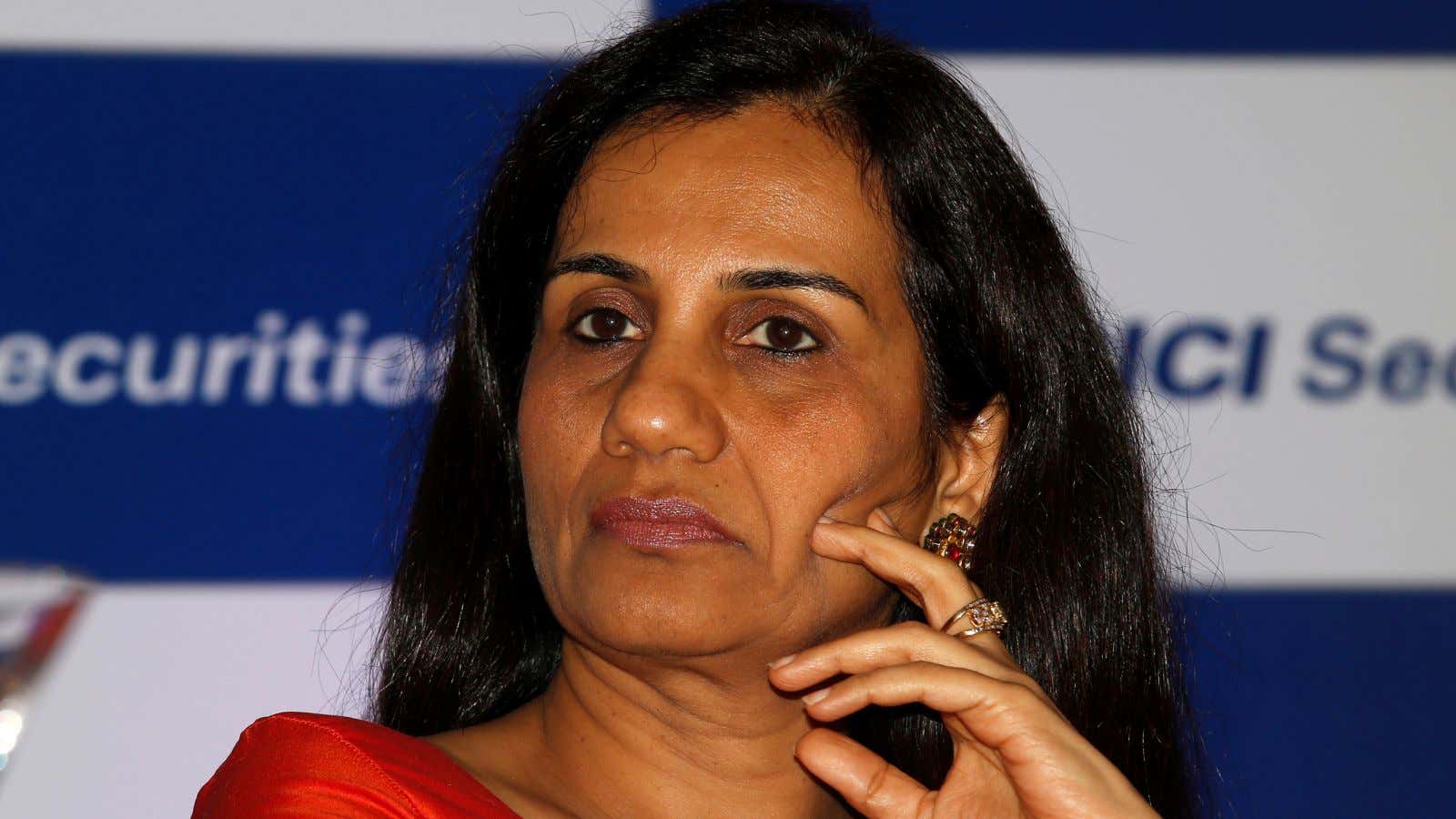It has been a tumultuous year for Indian banking chieftains.
On Oct. 04, Chanda Kochhar made an unceremonious exit as CEO of ICICI Bank, the firm she has been associated with for 34 years. She opted for an early retirement as a probe against her is underway.
Hers is the latest in a string of such high-profile exits in recent months.
When 2018 began, no one would have imagined the fall from grace of Kochhar, Shikha Sharma, Usha Ananthasubramanian, and Rana Kapoor—all poster children of the country’s banking industry. But here they are, forced to march out of their corner offices following issues ranging from frauds, bad loans, and a lack of corporate governance.
Here’s a closer look at some of the top industry leaders abruptly booted out this year:
Chanda Kochhar
Kochhar joined ICICI, now ICICI Bank, in 1984 as a management trainee. She climbed the rungs of power to become the managing director and CEO in 2009. She took over the bank’s reins at a time when financial companies worldwide were grappling with a global meltdown.
Since then, she’s been widely credited with building the lender’s retail business and its expansion.
However, earlier this year, she came under a cloud of suspicion after a whistleblower alleged a conflict of interest, lack of disclosures, and a quid pro quo in granting of loans to the now-bankrupt Videocon Industries. Videocon chairman Venugopal Dhoot had also invested in NuPower Renewables, a company established by Kochhar’s husband, Deepak Kochhar. Thus, it was Deepak Kochhar’s firm that benefited from the loans.
Their complex web of transactions is now being probed by the Central Bureau of Investigation (CBI) and market regulator Securities and Exchange Board of India (SEBI). Even ICICI Bank’s board has set off an independent probe. Kochhar has been on indefinite leave since June.
The bank’s probe is expected to be completed in about a month.
Shikha Sharma
In 2008, Sharma and Kochhar, as ICICI Bank’s senior employees, were both in the race to take over as the bank’s chief. However, a month after Kochhar was promoted to CEO in 2009, Sharma quit to lead Axis Bank, the country’s third-largest private sector bank by assets.
Like her peers, Sharma also strengthened her bank’s retail business, relatively insulating it from the downturn in the corporate sector. She also acquired Enam Securities in an audacious all-stock deal; this controversial move eventually helped Axis Bank get a toehold in the investment banking arena.
However, in the last few years, the bank’s performance has taken a beating as bad loans have piled up. Under Sharma, its gross NPAs increased from 0.96% in March 2009 to 6.77% as of March 2018.
Apart from financial troubles, the bank has also faced credibility issues as there were under-reporting of NPAs, besides allegations of insider trading.
So her performance came under the Reserve Bank of India’s (RBI) scanner. The RBI was reportedly hesitant about granting her another term as CEO even though the board had approved it earlier this year. In April, Axis Bank finally informed the stock exchanges that Sharma has cut short her tenure by two years and will step down by Dec. 31, 2018.
Rana Kapoor
Kapoor had first dipped his toes in banking as an intern at Citibank in 1979. Nearly 25 years later, he founded YES Bank, now the country’s fourth-largest private sector lender by assets.
Last month, the RBI cracked its whip on his firm, refusing to grant him an extension as the bank’s chief beyond Jan. 31, 2019. The full course of this tenure was till September 2021.
While the central bank didn’t cite any reasons, the repeated under-reporting of toxic loans, which came to light in the RBI’s asset quality review, is believed to have played against YES Bank. In financial year 2016, it reported a divergence of Rs4,176 crore ($580 million) in its gross NPAs. The next year, once again, the RBI’s audit revealed under-reported bad loans of Rs6,355 crore—three times the reported amount.
Now, the bank’s board is trying to find a successor to replace Kapoor.
Usha Ananthasubramanian
In February, the biggest ever fraud in the Indian banking sector was exposed. Nearly $2 billion were siphoned off from state-owned Punjab National Bank (PNB) over seven years by two diamantaires, Nirav Modi and his uncle Mehul Choksi.
In May, in a charge sheet filed by India’s CBI, Ananthasubramanian was named an accused. She was the MD and CEO of PNB between August 2015 and May 2017, during which period she is believed to have ignored the loopholes in the bank’s security framework that allowed the fraud to be perpetrated.
At the time of the exposé, she was heading Allahabad Bank, another public sector lender. On the last day of her term at the bank, the government dismissed her from her services. The centre also permitted the CBI to prosecute her, bringing to an ignominious end her career of nearly four decades.
Meanwhile, the CBI is also probing KC Chakrabarty, the former deputy governor of the RBI, in a case related to loans sanctioned to liquor baron, Vijay Mallya.
Indian bankers surely would want 2018 to get over soon.
Want to read more from Nupur Anand? Subscribe to Quartz Private Key—Quartz’s premium crypto newsletter, delivered twice weekly.
